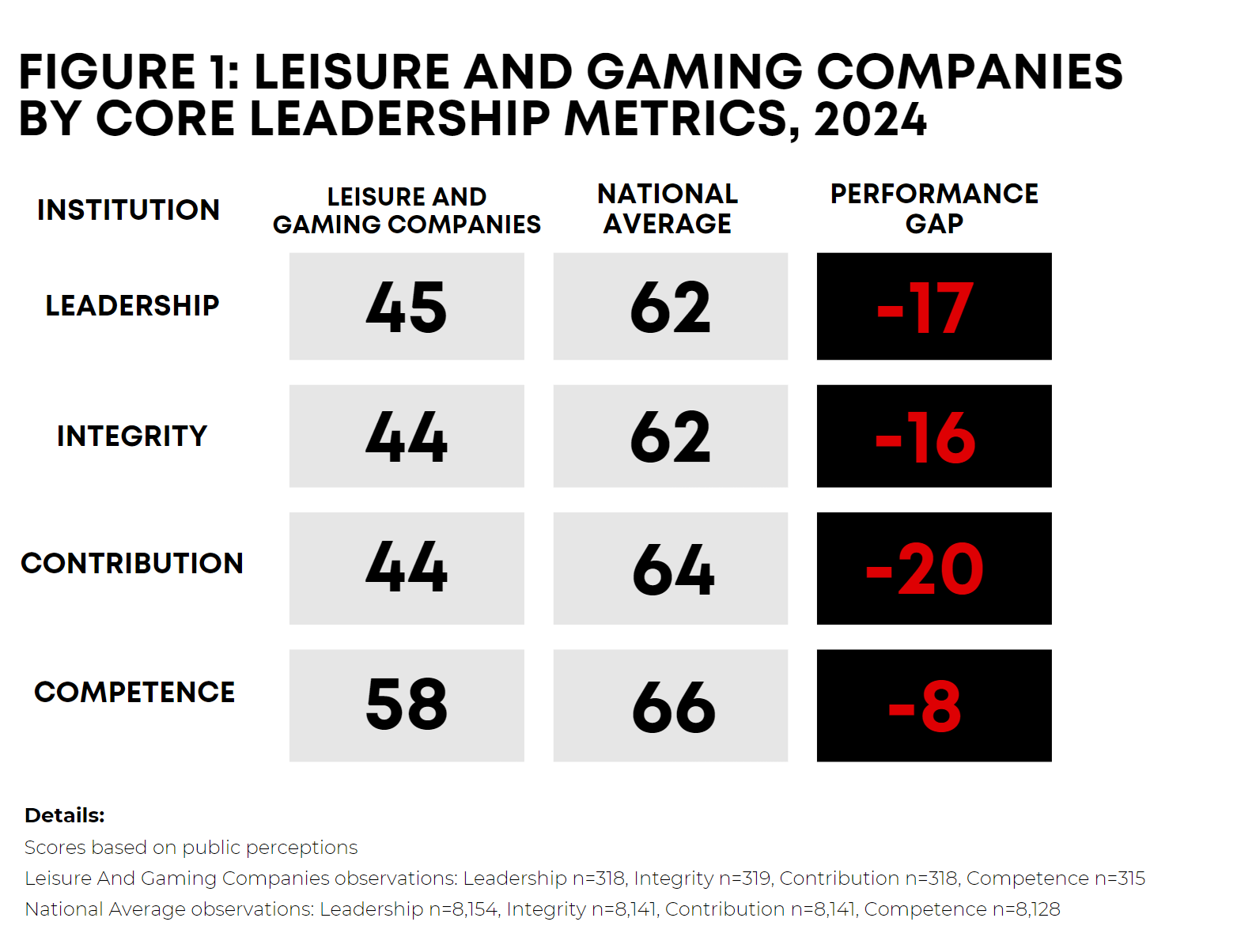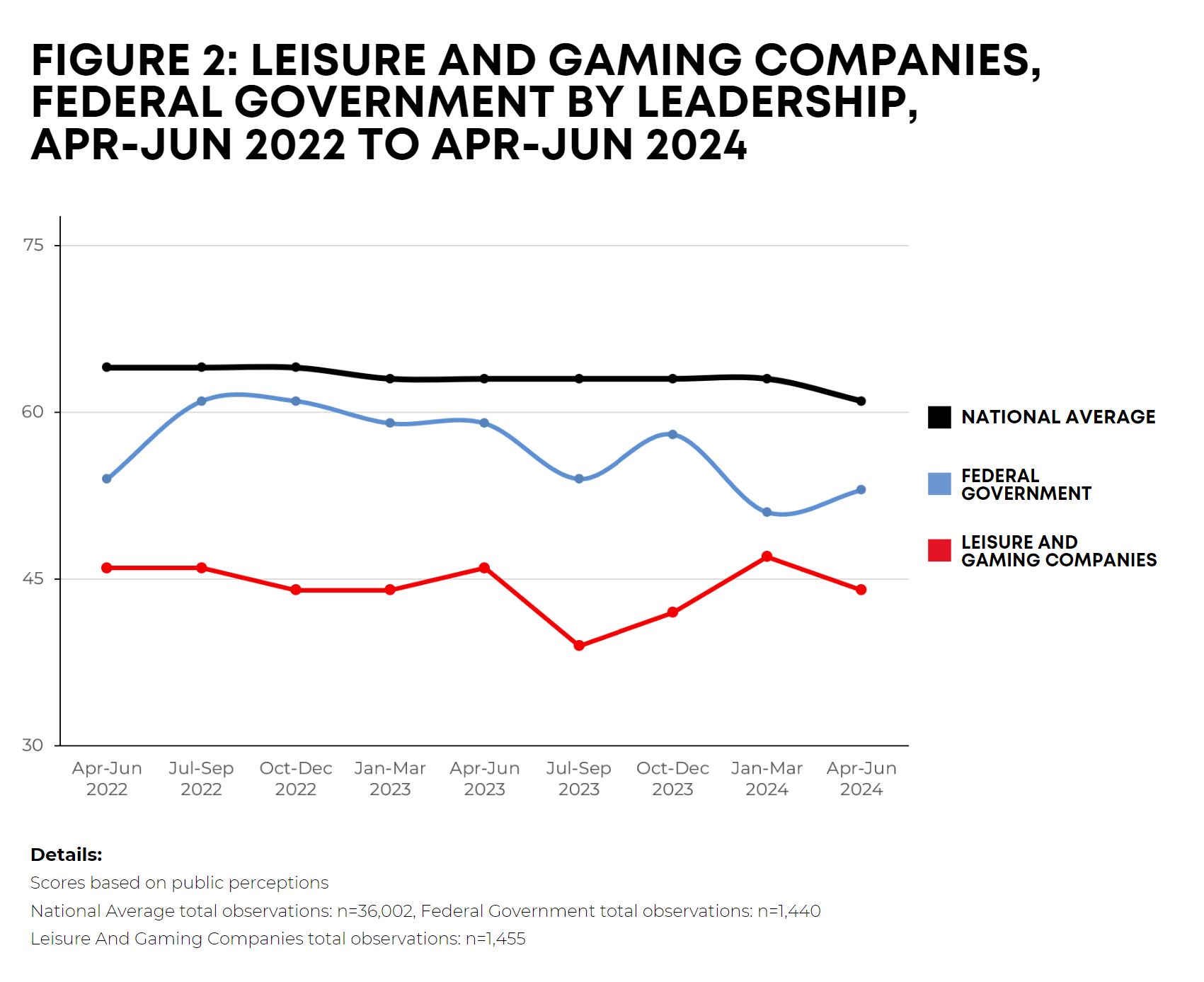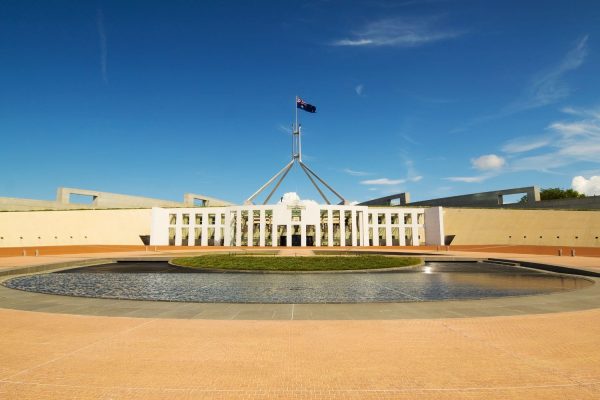The Australian Leadership Index reveals a bleak picture of the gambling industry’s leadership. Leisure and gaming companies consistently rank at the bottom among Australian institutions, particularly for integrity, societal contribution and overall leadership.
This crisis of perception is unsurprising given the controversies that have plagued the industry—from ‘disgraceful’ conduct at Crown Casino to contributions to the post-COVID mental health crisis. These issues, many caused or worsened by the industry itself, highlight the urgent need for comprehensive reform. Yet, government efforts have been largely ineffective, with the recent proposal to ban gambling advertising diluted even before reaching parliament.
To improve leadership perceptions, the industry must reduce its negative impact on society. Australia is recognised as a global leader in gambling technology, and our data indicates it is viewed as somewhat competent. However, without decisive intervention, our gambling addiction—and its harmful effects—will only grow. This article delves into the pressing challenges facing the industry and the critical areas requiring attention for any improvement in public perception.
Attempts To Fix Australia’s Gaming Addiction
From ASX-listed pokies manufacturer Aristocrat Leisure to cryptocurrency casino Stake, Australia has long been a world leader in the gambling industry, providing services domestically and internationally that generate billions of dollars revenue every year. This expertise is overshadowed by the industry’s negative impacts however, especially in recent years. Several government investigations have highlighted issues of criminal money laundering, breaches of gambling legislation and potential links to terrorist financiers, with these investigations leading to multi-million dollar fines and recommendations for ongoing reform.
The latest attempt to curb the negative effects of this industry is the federal government’s proposal to restrict gambling advertising. The Albanese government is planning to introduce legislation that would limit gambling advertising during general TV programming. However, this is a far step back from the original proposal by late Labor MP Peta Murphy. The original proposal, which has crossbench and Australian Medical Association support, would feature a total ban on gambling advertising, aimed at addressing the findings of a bipartisan parliamentary inquiry. But the likely dilution of this proposal showcases the power of Australia’s gambling addiction; a country where hundreds of gamblers commit suicide each year.
Breaking this habit has so far proved incredibly difficult, with the power of gambling lobbies, tax-related income and Australia’s dwindling media advertising market too strong to overcome. Ideally, gambling should be an activity that individuals and society can engage in without long-term harm. However, the current safeguards in place have failed to protect both individuals and the industry from self-harm. Without taking further, more impactful action the welfare of society will continue to be adversely impacted with long-term ramifications for leadership perceptions in Australia.
Perceptions Of Australian Gaming Industry Leadership
Leadership perceptions of the Australian gaming industry are dismal. Although perceptions of other private sector institutions fluctuate, ALI data reveals that Australians’ dissatisfaction with the gaming industry is deep and enduring. Leisure and gaming institutions have ranked lowest in our integrity and contribution metrics among all institutions throughout our survey’s history, and across our four core metrics (as illustrated in Figure 1) this industry falls well below the national average, never reaching within 15 points of overall leadership perceptions.

Competence is the only area where the industry approaches the national average—rated just eight points below the national benchmark—and it performs relatively well in terms of Tech Innovation (57/100) and Employment Opportunities (62/100). These scores indicate that the industry is seen as capable in core functions like product development, generating positive financial outcomes and service delivery. Competence alone cannot build public trust however, with leadership perceptions suffering without ethical leadership and a greater commitment to societal well-being.
Our data suggests that public concerns about the gambling industry’s leadership are closely tied to issues of integrity and societal welfare. The debate over advertising is not just about regulatory compliance; it’s about the industry’s responsibility to protect vulnerable individuals, especially children, from gambling-related harms. Effective leadership in any sector requires a balance of competence, integrity, and contribution—qualities that are widely perceived to be lacking in the gambling industry. The focus on profit over the greater good is out of step with public expectations and necessitates stronger government regulation for public perceptions to improve.
Breaking The Habit: Reducing Impact And Providing Gaming Industry Safeguards
Improving perceptions of the Australian gambling industry should not only be a priority for the industry itself; it should be considered a major priority for the Albanese government if it is to improve perceptions of the federal government. As shown in Figure 2 below, leadership perceptions of these institutions have at times mirrored each other, and the federal government’s inability to reign in the gaming industry has been a possible contributing factor to its own poor performance.

In fact, perceptions of Australian leadership in general would be improved if the federal government is able to address the leadership issues that have plagued this institution. The gambling industry has consistently demonstrated resistance to regulatory changes, prioritising profit over the well-being of the community. This entrenched stance underscores the need for strong government intervention to enforce the necessary reforms if leadership perceptions of the industry are to be improved.
Taking action to improve the transparency and accountability of Australian gaming institutions has typically been the government’s core focus, but to see long-term, generational change the drastic step to banning all gambling advertising may be necessary. The effects of Australia’s gambling addiction have simply been too strong, leading to corruption in the private sector, reliance on taxation and advertising revenue and significant impact on the wellbeing of ordinary Australians. Reducing the bombardment of advertising, particularly towards younger Australians, may lead to long-term success and a moderation of this gambling addiction.
Throughout our leadership data there are clear warnings that the public is becoming increasingly despondent with the state of Australian leadership. At a time where Australians are under strong financial pressures, they are repeatedly seeing our private sector evade regulatory bullets, manipulate prices and consistently rort the system. Taking drastic action, particularly in this industry, may needed to improve leadership perceptions in Australia, winning back the house edge and forcing the leisure and gaming industry to contribute to the greater good.




